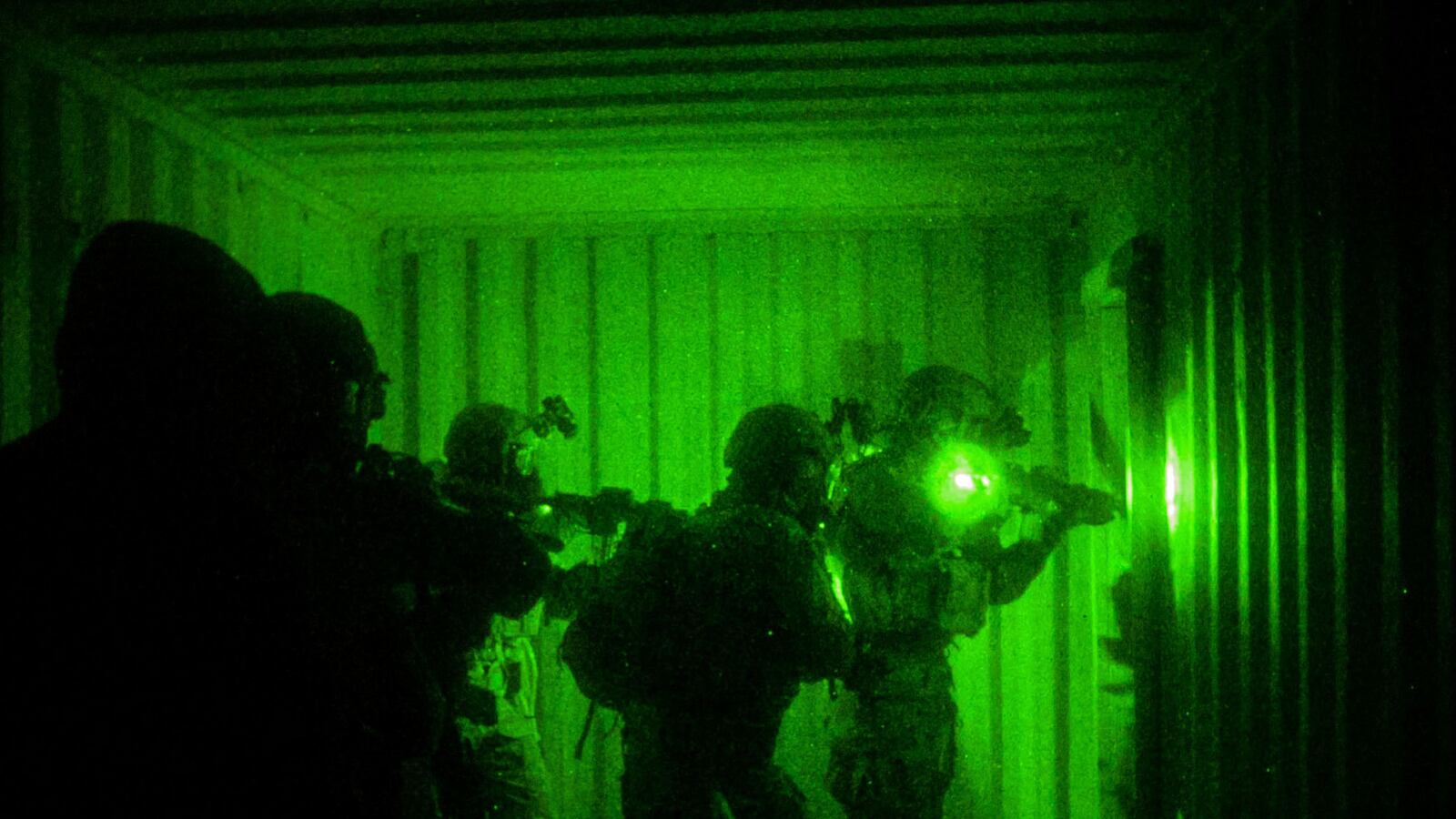Anyone paying attention to the escalating war against ISIS took notice last week when the White House announced that a first-of-its-kind special operations mission inside Syria had killed one of the group’s commanders. ISIS members certainly took note. So did U.S. military and intelligence veterans who questioned the wisdom of announcing the clandestine mission less than 24 hours after military helicopters lifted out of Syria.
The raid, which official accounts depict as a daring mission and tactical success, was announced one day after ISIS forces began an offensive on the Iraqi city of Ramadi. Taking control of Ramadi marks the jihadi army’s capstone victory since capturing Mosul last summer. In that light, the decision to go public with the mission, while Ramadi was falling, was taken by some observers as a response to mounting criticisms that U.S. policy was failing to contain ISIS’s advances.
“We always have to admit the possibility that decision makers are working with information and calculations we’re not privy to,” said one Army Special Forces soldier about the decision to publicize the Syria mission. But, he added, “There is an equal possibility that they are either being … self-serving.”
“Raids will only be as successful as the White House is patient in releasing details,” said Michael Pregent, a former Army intelligence officer who later worked for the Defense Intelligence Agency. (Last week I co-authored an article with Pregent on the politics of the Iraqi government’s anti-ISIS strategy.)
“We should let the ISIS network find out what happened and tell the intelligence community,” Pregent said, “as opposed to the administration going in the weeds on hand-to-hand combat vignettes set to a Metallica soundtrack.”
The Army’s elite and secretive Delta Force, reportedly the unit that carried out the raid, was looking “to capture an ISIL senior leader,” called Abu Sayyaf. That’s according to the next-day White House press release, which used ISIL as an alternate acronym for the group also known as Islamic State or ISIS.
But the mission touched off a firefight in which Delta operators killed Sayyaf along with a reported dozen other ISIS fighters. Sayyaf’s wife, also a target of the raid, was captured and brought to Iraq for interrogation. No U.S. forces were injured in the mission, which, according to the press release, also “led to the freeing of a young Yazidi woman who appears to have been held as a slave by the couple.”
The raid happened on a Friday night. That Saturday, the White House posted its official account.
There’s a reason why specialized military operations, like the Sayyaf raid, ordinarily aren’t disclosed right away. Capture missions are often about gaining intelligence, some of which has a shelf life, and which needs to be acted upon quickly. Broadcasting details of the raid before any intelligence it yielded has been fully analyzed tips off ISIS to their own vulnerabilities and gives them time shore them up.
“When within 24 hours we start discussing details of a raid,” the Special Forces soldier said, “there’s a chance that it will nudge them in the proper direction of adaptation.”
Chatter among ISIS members online suggests some adaptation has already begun.
“Immediately after the reports first surfaced the response was pretty much confusion,” said Charlie Winter, who monitors online jihadi activity as a researcher for the London based counter-extremism think tank, Quilliam. “In the wake of any sort of attack like this there is paranoia,” Winter said. “You have to ask yourself how are all of these leaders being identified and located.” ISIS members responded by focusing on the threat from informants, Winter said.
“The reason this has happened is because of the spies. Someone from inside has helped them,” a jihadi fighting in Syria told Reuters days after the raid was announced. In response, ISIS is “considering tightening its recruitment procedures to try to root out moles and was considering forming a specialist unit to counter such attacks,” according to the Reuters report.
But wars are never just about tactical or material advantages. Armies might fight on their stomachs, but the public they rely on for support sees with its eyes. Keeping public support for a war sometimes requires revealing tales of daring—and successful—nighttime raids.
“It’s a trade-off, ” said former Army officer and counter-terrorism expert Clint Watts, “between what you can do with the intelligence and needing to have a victory over ISIS.”
Watts’s analysis, expressed in a post he wrote for the Foreign Policy Research Institute’s site, where he’s a senior national security fellow, said the raid may be “a game changer.” Watt’s believes the “successful raid will go much further to erode ISIS than the past many months of airstrikes and partner ground operations” by knocking down the group’s aura of invincibility, disrupting its financial and military operations, and exposing it to future targeted ground strikes.
Army General Joseph Votel, who heads U.S. Special Operations Command, spoke with The Daily Beast’s Kim Dozier recently about the battle over perception in the war against ISIS: “To be effective against an organization like ISIL, I think we have to … expose ISIL for what it really is. For its empty promises … for the brutal tactics that it applies. I think our ability to get information out on that will largely be more effective against the population we are trying to present that to, than will be successful operations on our part.”
In other words, getting the news of an ISIS defeat out to the group’s terrorized population could do more to undermine it than any actual raid.
Retired Army Lieutenant General Mark Hertling, former commander of United States Army Europe, expanded on the benefits of going public with the raid. “The narrative to counter the belief that ISIS is 10 feet tall is critically important,” Hertling said. “If [ISIS] propaganda remains unchallenged they will continue to recruit, continue to build coffers, continue to have other like minded terrorist groups covet joining their ranks.”
In Hertling’s view, there is a critical need at the strategic level of U.S. policy, “to kill/capture financiers, info ops specialists, web masters, sharia imams, and their ilk...and publicize that we're doing this as well as bombing the pipe swingers. This strike was a strategic target in one of the lines of operations in the U.S. Strategy.”
Former Army and DIA officer Pregent believes “the raid served notice to mid-level commanders that they are targets as well.” This, he said, would cause “distrust and paranoia in the ranks,” weakening ISIS’s internal cohesion. But those gains were partly undermined, Pregent said, by releasing the details and triggering ISIS to toughen up it operational and communications defenses and triggering the group to adopt new countermeasures.
Most of the military and intelligence veterans who spoke with The Daily Beast agreed that there are benefits, in the abstract, to going public with successful counter-terrorism missions even if that means losing some operational advantages. The question is how to strike that balance.
You know the balance has tipped, the Special Forces soldier said, “when we start talking about what platforms we’re using, where they staged out of, their general direction of approach, the units that were involved.”
Former CIA officer Nada Bakos offered some ground rules for releasing information about clandestine operations. “There needs to be some day limit,” she said. “You need lead-time from an intelligence perspective to follow up on anything you would have gained from that raid. Give it two or three days before you publicize it.”
Update, May 24, 9:55: A new Quote from retired Lieutenant General Mark Hertling, former commander of United States Army Europe (USAEUR), has been added to this article. It addresses the benefits of publicizing successful military operations to as a counter-narrative to ISIS’ propaganda hyping the group’s strength.
Correction: Due to an editing error this article originally stated that a military special operations raid into Syria, “was announced one day before ISIS forces captured the Iraqi city of Ramadi.” The use of 'captured' was imprecise since by some accounts the city was not under full ISIS control until two days after the ISIS attack began. The line has been changed to reflect that the official White House statement was made the day after ISIS forces began their offensive on Ramadi, but at a point when ISIS control of Ramadi was still being contested by Iraqi Security Forces remaining in the city.






